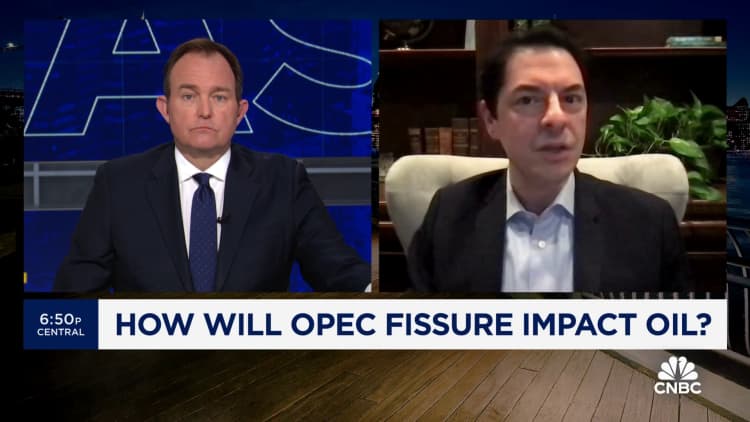
Angola's announcement this week that it will quit the oil producers' Organization of the Petroleum Exporting Countries brings to a head longstanding tensions within the powerful group, but market impact is likely to be limited, according to analysts.
The move "did not come as a surprise, [as] the writing was on the wall already last month," Clay Seigle, director of the global oil service at Rapidan Energy Group, told CNBC's "Last Call" on Thursday.
A meeting of the extended OPEC+ group in November was dominated by a deep disagreement on production baselines — the levels that determine quotas and compliance — with oil-reliant Angola and Nigeria both opposing efforts to deepen their baselines as they seek to boost their declining outputs. Angola's oil minister said Thursday that OPEC membership no longer served the country's interests.
Angola's exit leaves OPEC with 12 members, with oil production of about 27 million barrels per day, or around 27% of the world crude market, according to Reuters. Angola accounted for less than 4% of OPEC output, Scotiabank analysts said.
Angola follows on the footsteps of Ecuador and Qatar, which left the organization in 2020 and 2019, respectively.
"We think it's really a one and done move between Angola and OPEC," Seigle told CNBC's Brian Sullivan.
"The market should not get complacent, thinking that OPEC cohesion is falling apart and there's going to be some kind of domino effect."
Giovanni Staunovo, commodities analyst at UBS, noted that oil prices had already rebounded from a dip on Thursday.
"The explanation is that from an oil market supply perspective, the impact is minimal as oil production in Angola was on a downward trend over the last years," he said in emailed comments Friday.
"No one expects that the departure of Angola from OPEC is likely to result in more barrels hitting the market, as higher production would first require higher investments."
The market has concerns about unity, but there is no indication at present that heavyweights within the alliance intend to follow Angola's path, Staunovo added.
Rising tension
Analysts at Scotiabank said in a note Thursday that, while there would be no impact on global oil supply due to Angola already maximizing its production, the latest OPEC departure was "another example of the rising tension" in the group.
"We won't be surprised if other more marginal players such as Congo, [Equatorial Guinea], Gabon, etc. revisit their OPEC membership," they wrote.
The analysts therefore expect a slightly negative impact on energy shares in the near term, since the move "provides a fresh excuse for the players to extend their negative bias in the oil market."
More significant than Angola's departure is the upcoming introduction of Brazil to OPEC+ — which reunites OPEC members and allies including Russia — and the fact that U.S. crude output is currently at record highs, Rapidan's Seigle said.
"[Those producers] are really moving the needle on global supply-demand balances and in a way presenting a bit of a challenge for the members of OPEC+ to manage a pretty well-supplied market, relative to demand, not just in the coming year 2024 but in the next several years."
"That's going to be the challenge they face, in trying to send the right signals to the market that they have the capability and the cohesion to continue that balance," Seigle added.
Brazil has yet to accept a production quota, and its energy minister said in November that the country must still review the document that underpins the OPEC+ partnership.
Correction: Qatar left OPEC in 2019. An earlier version misstated the year.


